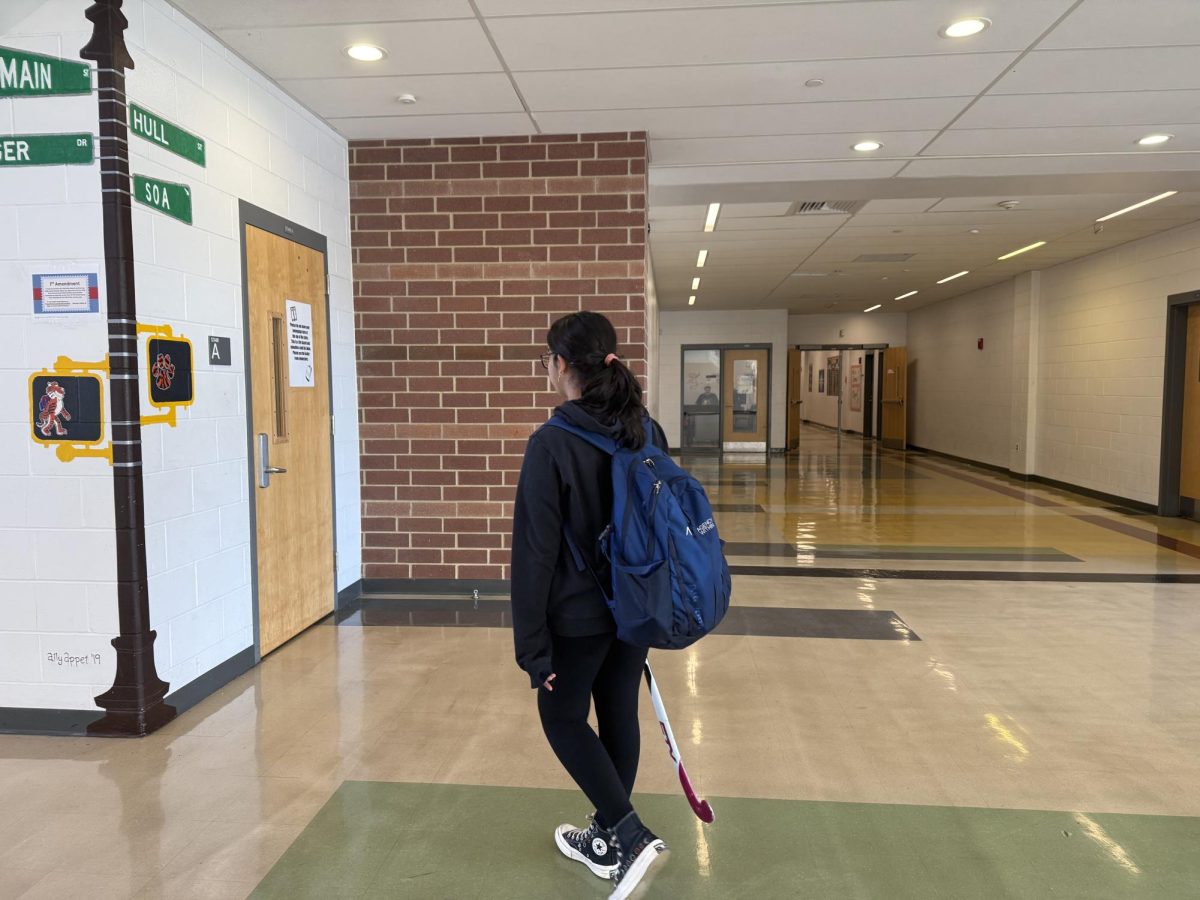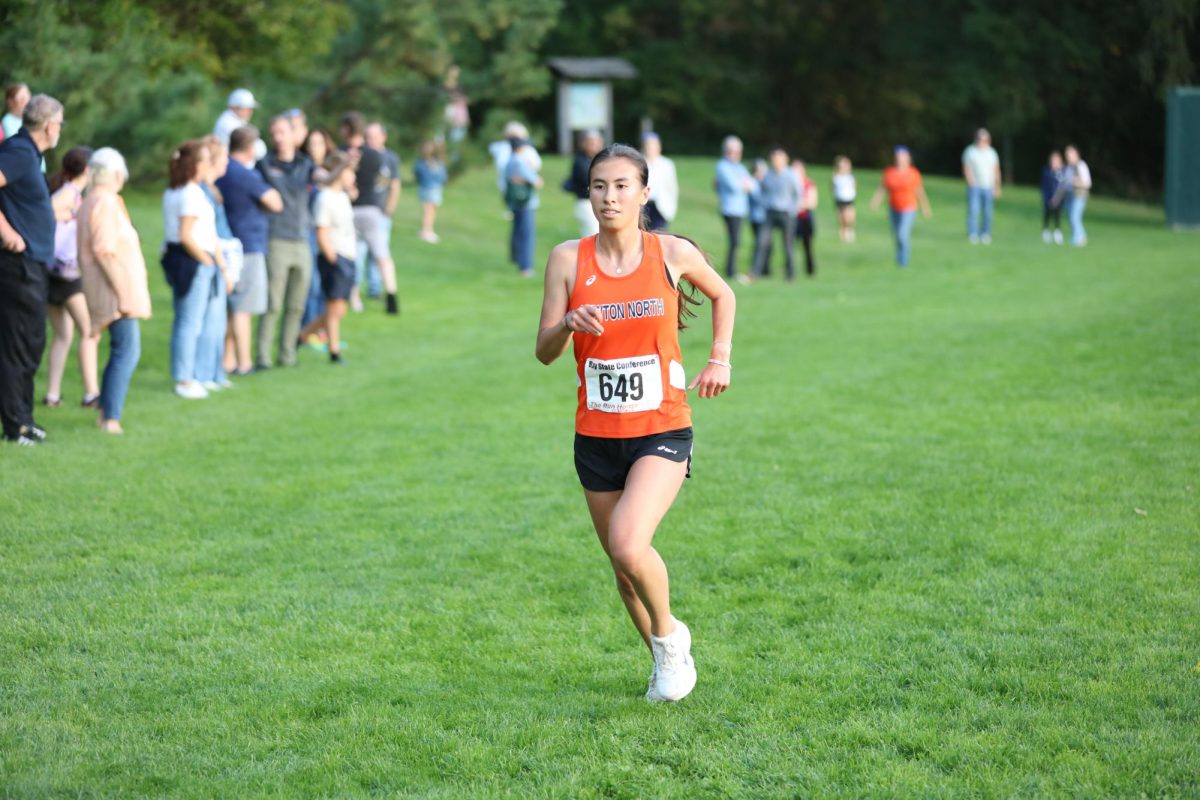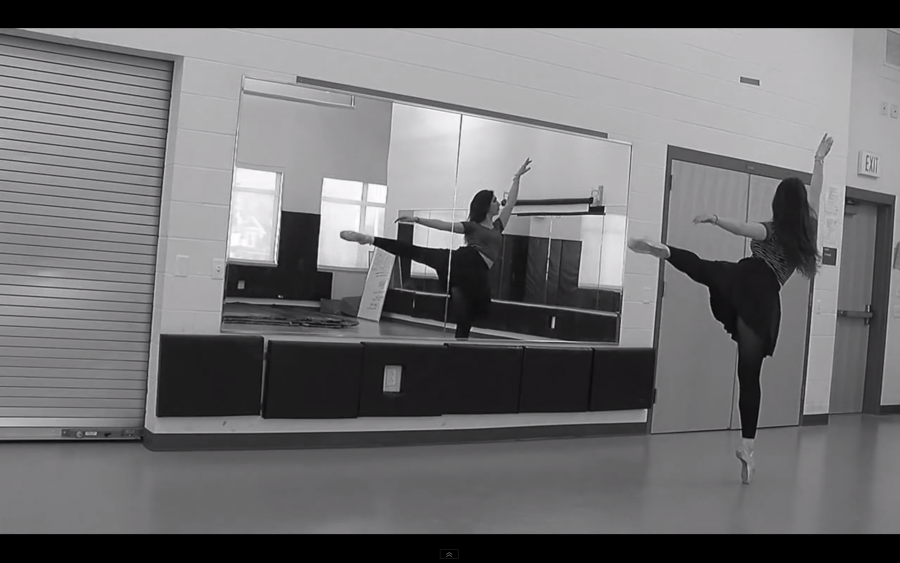by Elena Schwartz
There is something different about TV production this year, and it starts with Scott Dunlop, the new TV and Video Production teacher.
As someone with experience in film and television, Dunlop approaches TV production with “a different set of skills” from those the department has previously seen, as the class was traditionally taught from a media literacy prospective.
Equipped with this experience, Dunlop was the driving force behind the creation of two new courses, Broadcast Journalism and Intermediate TV and Video Production, which students may enroll in for the coming fall.
Dunlop’s interest in TV and movies began while he was volunteering with Americorps in Utah on an Indian reservation “three hours from the nearest WalMart, which was a strange, trying experience.” He began keeping journals documenting the period he spent there and thought they would make “a great screenplay.”
Dunlop met a producer who read his script and offered him an opportunity to work on a movie set, at which point he moved to Denver. During this process, Dunlop “fell in love with film and being on a movie set.”
Although the film he worked on, “Looking for Sunday,” was never released, the experience inspired Dunlop to consider working in TV and screenwriting. He subsequently moved from Denver to Los Angeles, where he worked in production for multiple networks, including MTV, NBC, E! Entertainment.
Eventually, Dunlop—who grew up in Watertown—decided he “wanted to come back home” and took a position producing a show in Boston for National Geographic. When the show was over, he began to look for teaching jobs in the area. Dunlop found work in the Newton school system as an assistant teacher and “lo and behold this job opened up.”
“I was very fortunate to be in the right place at the right time, with the right background and experience” said Dunlop.
Although this is Dunlop’s first year teaching at this school, he has already instituted changes in the TV Production department.
Dunlop is attempting to shift the TV production class’s focus away from types of advertising and media literacy (understanding the vocabulary of media) to “the more hands-on aspects of producing videos.”
“We’re trying to film more, edit more, and produce more content that we can put on NewTV,” said Dunlop. “We’re also hoping to collaborate more with other programs within the school, such as Fine & Performing Arts.”
This content is aired in the form of a 30 minute television show, TigerVision (previously TigerTube), which is can be viewed on NewTV on channels Comcast 99, Verizon 32, and RCN 3. TigerVision’s season premiered on Monday, February 2.
“We’re trying to bring a little bit more production and post-production to the making of TigerVision,” said Dunlop, “which includes putting more focus on each stage of production: students prepare a log line, a storyboard, a script—elements you might skip over if you were trying to rapidly produce stuff.”
“That’s why we painted the sign out here and that’s why we put up the pin board across the hall. We want everyone to know they can watch the things we create on NewTV when they air. These kids deserve the same publicity for what they produce as do students in the other programs in this school,” said Dunlop.
This year, the film classes will join the leadership team on its trip to New Orleans in April. The film students will create a documentary, which Dunlop hopes will raise awareness of their work.
Dunlop is in the process of moving the TV Production class from the English Department to the Career and Technical Education department to allow students to take more of these courses—possibly even major in TV production—and “really immerse themselves into TV and film.”
Of course, so much change is often a precursor to a host of challenges, and Dunlop’s case is no exception.
“I’m a first-year teacher, so just learning how to teach properly and inspire kids to learn more about film is difficult in its own right,” Dunlop said. “And trying to create a program is a ton of work. Even painting the sign [outside the studio] took 25 hours. Most days, I’m here from 7:30 in the morning to 5:30 at night.”
Dunlop also said, in the past film classes were “more of a boys’ club,” and he is aiming to change that.
“We want to do more than ‘Star Wars and zombies’ content,” said Dunlop. “We’re trying to create artistic pieces of film that will hopefully move people and make them laugh and inspire others to get involved in what we’re doing.”
It appears that Dunlop’s efforts are paying off. Junior Brianna Gershkowitz, a student in Advanced TV Production, said she appreciates the freedom she is given.
“There is a lot of leeway in the class because unlike an analytical essay or a history test, there is no wrong answer. In this class, all you need is creativity. You come up with an awesome idea and with time, effort, and dedication it gets finished and the results are extremely rewarding. TV Production not only teaches you the fundamentals like editing and camera work, but it also teaches you different ways of communicating with others and trusting yourself.”
Gershkowitz recently produced a music video to the song “Say Something” by A Great Big World starring students at this school and filmed and edited by Gershkowitz. The YouTube video currently has 1,424 views.
The making of the video took Gershkowitz two months from start to finish. The filming itself took a few days, according to Gershkowitz.
“This rarely happens,” she said, “but I finished my rough cut within an hour. When you have a vision, there’s no better feeling than seeing it fulfilled, so I was extremely determined.”
Gershkowitz called taking TV Production “the best decision of my life.”
Sophomore Ranen Green said he has learned “many skills” as a student in the Advanced TV Productions class, including “the technique and fundamentals of filmmaking, and the many ways that film has been used to tell stories.” He also claimed that TV Production has changed the way he views and understands TV and movies. Green has produced many videos, including “The Most Interesting Man at Newton North,” a satire of a commercial.
[divider]The Most Interesting Man at Newton North[/divider]
“Every time I watch something I tend to pay more attention to why things are the way they are,” said Green. “I think about why a certain shot was used or why a shot was cut at a certain point. I tend to pick up on things that ordinary viewers wouldn’t even think about, and it influences me in the way I produce my films.”
Currently, four TV Production classes are offered: Intro to TV Production, Intermediate TV Production, and Advanced TV Production, as well as Broadcast Journalism.
Gershkowitz recommends taking as many of these classes as possible. “The world is constantly modernizing and media continues to spread. This class gives you the ability to experience that for yourself while sending a message and showcasing all talents: dancing, acting, public speaking, etc….The list is endless. How many other classes can you say that about?”
Extreme Makeover: TV Production Edition
March 19, 2014
0
Donate to The Newtonite
More to Discover









































